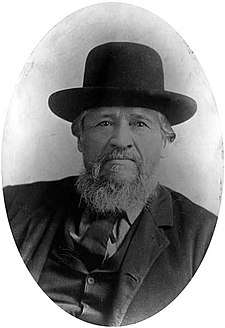Patrice Breland
Patrice Breland (March 17, 1837 – April 3, 1908[1]) was a fur trader and political figure in Manitoba. He represented St. Francois Xavier from 1879 to 1883 in the Legislative Assembly of Manitoba as a Conservative.He was born in St. Francois Xavier, Manitoba, the son of Pascal Breland and Maria Grant.[1] He was the grandson of Cuthbert Grant.[1] Breland married Helene Dease in 1863.[1] Helen and Patrice had seven children.[1] Breland was one of the many who signed the Cypress Hills Métis Hunting Brigade Petition in 1878.[2] He was a justice of the peace for the North West Territories and served as reeve for the Rural Municipality of St. François Xavier from 1891 to 1892 and from 1895 to 1900.[1] Breland died in St. Francois Xavier at the age of 71.[1]
Patrice Breland | |
|---|---|
 | |
| Legislative Assembly of Manitoba | |
| In office 1879–1883 | |
| Personal details | |
| Born | Patrice Breland 17 March 1837 St. Francois Xavier |
| Died | 3 April 1908 (aged 71) |
| Spouse(s) | Helen Dease |
| Children | Marie Rose, Marguerite, Patrice Tobie, Lucie, Emelie, Virginie, Marie Aexandre, Alfred, Patrice, Josephine, Joseph Edmund |
Early life
Patrice Breland was born in St. Francois Xavier, Manitoba on March 17, 1837.[1] He is the son of Pascal Breland and Maria Grant. His father Pascal was a French Métis leader.[3] Pascal was also a government diplomat.[3] Pascal was born in the Saskatchewan River Valley, June 15, 1811.[3] He was the son of Pierre Du Boishu, dit Berland and Louise Belley.[3] Later after Pascal and family moved to the Red River Settlement he married Maria Grant.[3] Maria Grant, daughter of Cuthbert Grant came from a wealthy family.[3] Pascal became a very wealthy man due to all that he inherited after the passing of Cuthbert Grant in 1854.[3]
Family life
Patrice married Helen Dease. According to Manitoba Historical Society Patrice and Helen had seven children:[1] Tobie, Alexandre, Alfred, Dolphis, Edmond, Josephine, and Virginia.[1] In and article by Lawrence J. Barkwell, Patrice and Helen had eleven children:[2] Marie Rose, Marguerite, Patrice Tobie, Lucie, Emelie, Virginie, Marie Alexandre, Alfred, Patrice, Josephine, and Joseph Edmund.[2]
Manitoba Act
During the time of the creation of the Manitoba Act, the Legislative Assembly of Assiniboia was deciding between a unicameral or bicameral style of government.[4] Decisions were leaning towards a bicameral style government.[4] After leaving Fort Garry the Manitoba Act continued to be in review and the idea of having a Senate was discussed.[4] Throughout this discussion of a Senate, a possible structure and possible candidates were mentioned.[4] Patrice Breland was amongst the list of possible candidates for the Senate.[4]
See also
References
- "Patrice Breland (1837-1908)". Memorable Manitobans. Manitoba Historical Society. Retrieved 2012-10-03.
- Barkwell, Lawrence (2015). Cypress Hills Metis Hunting Brigade Petition of 1878 for a Metis Reserve. Library and Archives Canada Cataloguing in Publication.
- Stevenson, Allyson (2009). ""Men of their own blood": Metis Intermediaries and the Numbered Treaties". Native Studies Review. 18: 67–90.
- Grebstad, David (June 22, 2014). "A tale of two houses: the rise and demise of the Legislative Council of Manitoba, 1871-1876". Manitoba History. 75 – via Gale Academic Onefile.